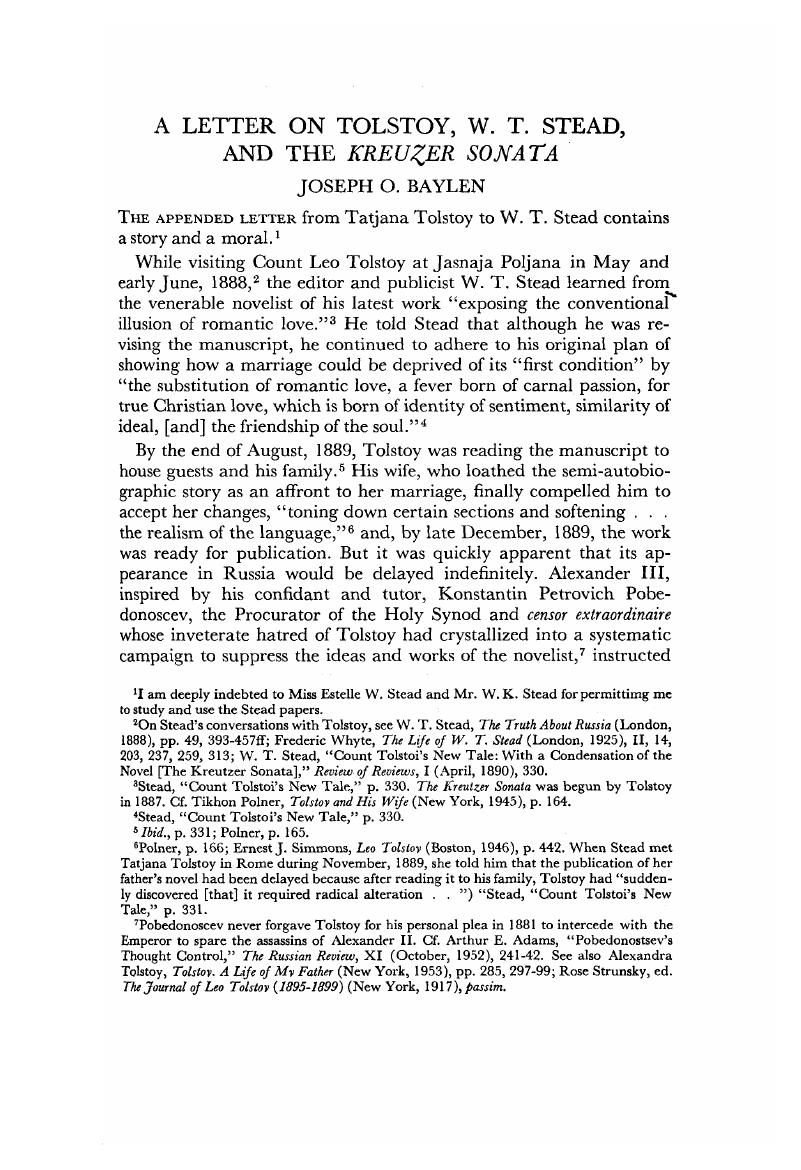No CrossRef data available.
Article contents
A Letter on Tolstoy, W. T. Stead, and the Kreuzer Sonata
Published online by Cambridge University Press: 25 March 2019
Abstract

- Type
- Letter
- Information
- Copyright
- Copyright © Association for Slavic, East European, and Eurasian Studies 1957
References
1 I am deeply indebted to Miss Estelle W. Stead and Mr. W. K. Stead for permittimg me to study and use the Stead papers.
2 On Stead's conversations with Tolstoy, see Stead, W. T., The Truth About Russia (London, 1888), pp. 49 Google Scholar, 393-457ff; Whyte, Frederic, The Life of W. T. Stead (London, 1925)Google Scholar, II, 14, 203, 237, 259, 313; W. T. Stead, “Count Tolstoi's New Tale: With a Condensation of the Novel [The Kreutzer Sonata],” Review of Reviews, I (April, 1890), 330.
3 Stead, “Count Tolstoi's New Tale,” p. 330. The Kreutzer Sonata was begun by Tolstoy in 1887. Cf. Tikhon Polner, Tolstoy and His Wife (New York, 1945), p. 164.
4 Stead, “Count Tolstoi's New Tale,” p. 330.
5 Ibid., p. 331; Polner, p. 165.
6 Polner, p. 166; Ernest J . Simmons, Leo Tolstoy (Boston, 1946), p. 442. When Stead met Tatjana Tolstoy in Rome during November, 1889, she told him that the publication of her father's novel had been delayed because after reading it to his family, Tolstoy had “suddenly discovered [that] it required radical alteration . . “) “Stead, “Count Tolstoi's New Tale,” p. 331.
7 Pobedonoscev never forgave Tolstoy for his personal plea in 1881 to intercede with the Emperor to spare the assassins of Alexander II. Cf. Arthur E. Adams, “Pobedonostsev's Thought Control,” The Russian Review, XI (October, 1952), 241-42. See also Alexandra Tolstoy, Tolstoy. A Life of My Father (New York, 1953), pp. 285, 297-99; Rose Strunsky, ed. The Journal of Leo Tolstoy (1895-1899) (New York, 1917), passim.
8 Simmons, p. 441. In spite of the censors, endless copies of the novel were lithographed and circulated in Russia. Polner, p. 165.
9 See introduction in Stead, “Count Tolstoi's New Tale,” p. 332. In this direction, Aylmer Maude, who knew both men well, wrote: “When in 1888, … Stead visited Yasnaya, the two men discussed a ‘Penny Universal Classical Library,’ and Stead's ventures in that direction were no doubt influenced by that conversation.” Aylmer Maude, The Life of Tolstoy: First Fifty Tears and Later Tears (London, 1908-10), II, 209.
10 Stead cited Miss Hapgood as having at first refused to translate the work and writing to him: “I have never read anything like it in my life, and I hope never shall again.” Stead, Count Tolstoi's New Tale,” p. 332.
11 The Kreutzer Sonata was published in Russia for the first time in 1891.
12 Tatjana Lvovna Tolstojaja Sukhótina (1864-1950), eldest of Tolstoy's daughters, served as his secretary during this time. In 1899, she married Mikhail Sergeyevich Sukhótin. Cf. Tatiana Sukhótin Tolstoy, The Tolstoy Home. Diaries of Tatiana Sukhotin-Tolstoy (London, 1950).
13 The inaugural issue of the Review of Reviews, Vol. I (January, 1890).
14 In the pages mentioned above, the author “E. J. D.” (undoubtedly the English expert on Russia, E. J . Dillon) reviewed a series of articles by Vladimir Solovëv for the Russian monthly, Messenger of Europe, for which the periodical received its “first warning” from the Imperial censor. In this series, Solovev declared that Russian “national political consciousness has for the [past] half century been nourished with … crumbs that fell from the intellectual table of the West,” and denounced the “abnormal love” of the Russian Church for traditional ceremonial as “a mental disease … paraded as a proof of the … superiority of the Russians, in the matter of religion, over Western peoples.” Cf. E. J. D., “The Periodicals of Russia,” Review of Reviews, I (January, 1890), 65.
15 Isabel Florence Hapgood (1859-1928). Cf. Tolstoy, My Father, p. 297.
16 A reference to Stead's citation of a statement by Walter Besant to the effect that a novelist must be careful not to destroy “the very basis of society” in his work. Besant further declared that “Art herself, … will not allow the creation of impossible figures moving in an unnatural atmosphere. Those writers who yearn to treat of the adulteress and the courtesan because they love to dwell on images of lust are best kept in check by existing discouragements … “ Cf. “Mrs. Grundy on Fiction,” Review of Reviews, I (January, 1890), 44.


